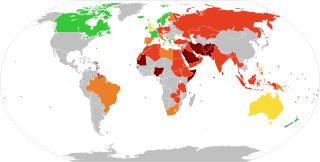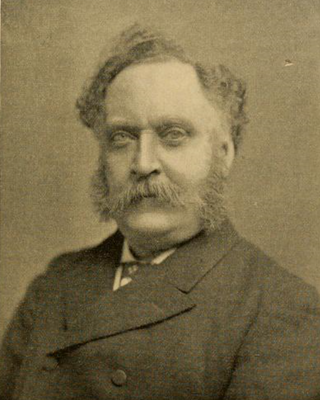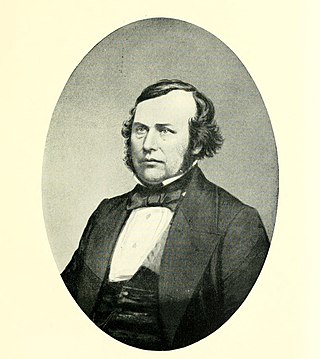Related Research Articles
Laws prohibiting blasphemy and blasphemous libel in the United Kingdom date back to the mediaeval times as common law and in some special cases as enacted legislation. The common law offences of blasphemy and blasphemous libel were formally abolished in England and Wales in 2008 and Scotland in 2021. Equivalent laws remain in Northern Ireland.
George Jacob Holyoake was an English secularist, co-operator and newspaper editor. He coined the terms secularism in 1851 and "jingoism" in 1878. He edited a secularist paper, the Reasoner, from 1846 to June 1861, and a co-operative one, The English Leader, in 1864–1867.
Thomas Aikenhead was a Scottish student from Edinburgh, who was prosecuted and executed at the age of 20 on a charge of blasphemy under the Act against Blasphemy 1661 and Act against Blasphemy 1695. He was the last person in Great Britain to be executed for blasphemy. His execution occurred 85 years after the death of Edward Wightman (1612), the last person to be burned at the stake for heresy in England.

Henry Hetherington was an English printer, bookseller, publisher and newspaper proprietor who campaigned for social justice, a free press, universal suffrage and religious freethought. Together with his close associates, William Lovett, John Cleave and James Watson, he was a leading member of numerous co-operative and radical groups, including the Owenite British Association for the Promotion of Co-operative Knowledge, the National Union of the Working Classes and the London Working Men's Association. As proprietor of The Poor Man's Guardian he played a major role in the "War of the Unstamped" and was imprisoned three times for refusing to pay newspaper stamp duty. He was a leader of the "moral force" wing of the Chartist movement and a supporter of pro-democracy movements in other countries. His name is included on the Reformers' Memorial in Kensal Green Cemetery.

A blasphemy law is a law prohibiting blasphemy, which is the act of insulting or showing contempt or lack of reverence to a deity, or sacred objects, or toward something considered sacred or inviolable. According to Pew Research Center, about a quarter of the world's countries and territories (26%) had anti-blasphemy laws or policies as of 2014.
William Chilton, was a printer, Owenite, evolutionist, and co-founder with Charles Southwell of The Oracle of Reason, which claimed to be the world's first avowedly atheist journal.
Charles Southwell was a radical English journalist, freethinker and colonial advocate.
The publishing of any "blasphemous libel" was a crime in New Zealand under Section 123 of the Crimes Act 1961 which allowed for imprisonment for up to one year. However, Section 123 protected all publications and opinions on any religious subject expressed in good faith and decent language against prosecution and specified that prosecution may proceed only with the leave of the attorney-general.

Charles Watts was an English writer, lecturer and publisher, who was prominent in the secularist and freethought movements in both Britain and Canada.
Irreligion in the United Kingdom is more prevalent than in some parts of Europe, with about 8% indicating they were atheistic in 2018, and 52% listing their religion as "none". A third of Anglicans polled in a 2013 survey doubted the existence of God, while 15% of those with no religion believed in some higher power, and deemed themselves "spiritual" or even "religious".
William Devonshire Saull was an English businessman, known now for his activities as geologist, antiquary and museum-keeper, philanthropist and supporter of radical causes.
The Rotunda radicals, known at the time as Rotundists or Rotundanists, were a diverse group of social, political and religious radical reformers who gathered around the Blackfriars Rotunda, London, between 1830 and 1832, while it was under the management of Richard Carlile. During this period almost every well-known radical in London spoke there at meetings which were often rowdy. The Home Office regarded the Rotunda as a centre of violence, sedition and blasphemy, and regularly spied on its meetings.

Secular Review (1876–1907) was a freethought/secularist weekly publication in nineteenth and early twentieth-century Britain that appeared under a variety of names. It represented a "relatively moderate style of Secularism," more open to old Owenite and new socialist influences in contrast to the individualism and social conservatism of Charles Bradlaugh and his National Reformer. It was edited during the period 1882–1906 by William Stewart Ross (1844–1906), who signed himself "Saladin."
Harriet Teresa Law was a leading British freethinker in 19th-century London.
Matilda Roalfe (1813-1880) was a British author, bookshop owner, and publisher. She was a friend of fellow feminist freethinker Emma Martin (1812-1851)
William Maccall (1812–1888) was a Scottish author and Unitarian minister.
Emma Martin was a British writer, socialist and free thinker. She is known for her public speaking on behalf of socialism and Owenism.

Robert Buchanan (1813–1866) was a Scottish socialist writer and lecturer, and journalist.
The Anti-Persecution Union was an organisation established by the freethinkers George Jacob Holyoake and Emma Martin in 1842, to aid in defending individuals accused of blasphemy and blasphemous libel. Its object was "to assert and maintain the right of free discussion, and to protect and defend the victims of intolerance and bigotry".
William John Birch (1811–1891) was an English rationalist writer.
References
- ↑ According to Stein (1985, p.635), the Oracle was the "first openly atheistic magazine ever published in English (and perhaps in any language)." Edward Royle, however, said that it "should be more accurately viewed as only one of a number of similar papers which were produced both in the years of social tension following the Napoleonic wars and again in the 'hungry forties'. What set the Oracle apart from its contemporaries was not its message but its language." (Royle 1974, p.75).
- ↑ According to Holyoake (1906, p.142), the "Defiant syndicate of four" responsible for the Oracle consisted of Southwell, Holyoake, Ryall and Chilton. Field is named in Royle 1974, p.72. The Oracle of Reason was published by "Field, Southwell and Co."
- ↑ The Oracle of reason, or, philosophy vindicated. London: Field, Southwell & Co. 1841.
- 1 2 Royle 1974, p.321.
- 1 2 Royle 1976, p.42.
- ↑ Royle 1974, p.77.
- ↑ Royle 1974, p.77-78.
- ↑ Royle 1974, p.78. For Holyoake's account see Holyoake 1906, pp.142–144.
- ↑ Royle 1976, p.42, 54; Royle 1974, p.80.
- ↑ Royle 1974, p.81. Holyoake's last issue was 27 August 1842 (Royle 1974, p.321)
- ↑ Royle 1976, p.55-57.
- 1 2 Royle 1974, p.81.